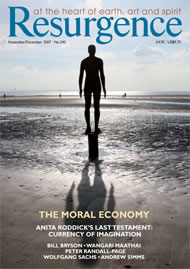THE WORLD IS in such a mess for all kinds of reason, but largely because the people with the most power do not understand agriculture. They do not perceive that it is at the core of all human life, and that it is and must be a craft. They see traditional, craft-based farming as an anachronism to be swept aside as soon as modernity can gain a foothold; and modernity, they perceive, is qualitatively different from all that went before, marching not to the crude rules of wild Nature and of bumbling tradition, but to the precise and rational directives of science and the global free market.
Marcel Mazoyer and Laurence Roudart show the nonsense of these ideas – though they are the ideas that run the modern world. Traditional practice on the whole is sound, precisely because it must march, perforce, to the drum of biology. Of course we can improve on traditional practice with science-based technology but we sweep the craft aside at our peril. It is the greatest folly to suppose that we can conquer Nature and impose our own rules on the fabric of the world.
The very first slash-and-burn farmers, who pre-dated the Neolithic Revolution of 10,000 years ago by a very long stretch, grew crops in forest clearings and then, when the residual fertility was exhausted, moved on. Slash-and-burn became bona fide agriculture when the farmers stayed to maintain the spaces they had cleared as permanent, arable fields for crops – fields known as the ager (hence ‘agriculture’).
Such maintenance required two kinds of input. First, the farmers had to cultivate the soil to make it receptive to seeds, and this they did first with spades and hoes, and then with primitive ploughs. Then in the 7th century BCE the Chinese developed true ploughs, or turn-ploughs, and the Europeans followed – perhaps independently – in the 1st century CE.
Secondly, ancient farmers (like modern farmers) needed to maintain the fertility of the ploughed ager. This they did by raising livestock in the semi-cultivated land all around – pastures – and then importing their dung; this they did mainly in periods of fallow between the arable cultivations. The big advances here were the wheeled cart, which enabled them to bring in the manure in large quantities – invented at least 5,000 years ago, it was not cheap enough for agriculture until the Middle Ages; then the stable, which enabled them to keep all the animals and their dung in one place; and then the scythe (developed first in Gaul, around the 1st century CE, and in wide use in the 11th century), which enabled farmers to cut hay for winter feed and so keep more livestock, which in turn enabled them to grow more crops – balancing one against the other. Three-year rotations – two years’ crops to one of fallow – were practised by the 13th century.
That’s it. That is what all farming is about: cultivating special fields with whatever power is available and bringing fertility in from outside. The greatest agricultural revolution, in short, was not in the 17th and 18th centuries, as we learnt in school, or in the Green Revolution of the 1960s and 1970s, as has become the modern political-commercial-scientific myth, but between the 11th and 13th centuries.
If we had built conscientiously on that medieval achievement, enhancing the craft and then adding science appropriately, then by now humanity could be set fair. Food just wouldn’t be a problem. We could feed the present 6 billion, and the 9 billion of 2050, and so on for the next million years – for the United Nations tells us that 9 billion is as big as the population will get.
Science has sometimes been used appropriately to enhance the craft. Thus the modern organic movement has helped to develop nitrogen fixation and biological pest control. Probably we should not reject any technology a priori. But on the whole we have not built on our heritage. We have allowed the nonsense to creep in: the idea, as
Henry Ford put it, that history is bunk; that the world began in 1980, as a bright-eyed, terrifying young MBA once said to me; that everything, including farming, should be a game of money; that the maximisation of disposable wealth is necessary and sufficient; that high tech, with enough money behind it, can achieve everything; that farming should be conceived as a high-tech
industry like everything else – industrial chemistry, heavy engineering, and biotech, with labour stripped to the bone and then stripped again; that the role of science is to sweep traditional practice aside; that the whole show is best left in the hands of men and women in striped suits and lab coats, who don’t know any history at all, and precious little real biology, but nonetheless are deemed to know best.
No wonder the world is in a mess.







